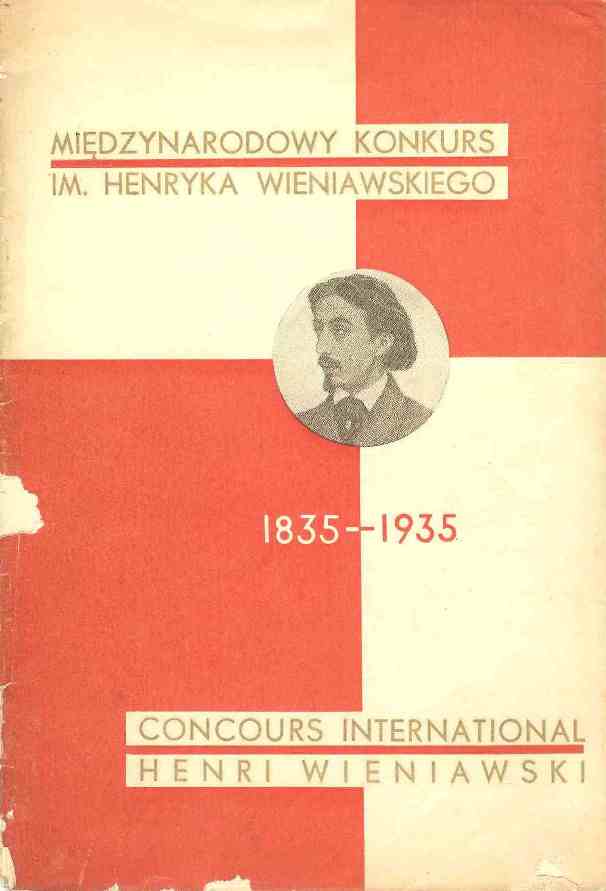1st International Henryk Wieniawski Violin Competition
Warsaw, 3-16 March 1935
Watch a documentary about the competition:
Organizers of the first edition of International Henryk Wieniawski Violin Competition, most of whom were members of the Music Society of Warsaw, worked for one and a half years to make the idea of its Chairman, Adam Wieniawski, come true. Adam Wieniawski — nephew to the famous composer, virtuoso, and one of the greatest artistic personalities of his time — had already had experience in organisation of similar events, as it was on his shoulders that preparation of the very successful, second (1932) edition of the Chopin Competition rested (the first event was held in 1927). It was perhaps soon after its completion that the Director of Warsaw’s Higher School of Music conceived of the idea to establish in Poland yet another platform for encounter with the world, this time for the violin players. 1935, the year of his famous uncle’s 100th birthday, was an ideal opportunity. The news of the planned undertaking spread — for the times — incredibly fast. The country’s highest dignitaries, incl. the President of the Polish Republic, declared their support and lent the cause their authority and public resources. The announcement of high financial prizes, which they endowed, unquestionably contributed to he already high number of applications for the competition. Even the French government, as if in anticipation of the results of the rivalry (!), awarded a handsome bonus in the national currency for their citizens, should they win any of the top places.
What is more important, though, from the very first moment, the Wieniawski Competition “validated the steadfastness of a certain truth. Irrespective of the presently widespread trend towards ‘standardization’ in everything, even in the manifestations of the human spirit, one could, to great joy, ascertain that what is considered the paramount reason behind artistic existence, is, after all, what is the fruit of originality, what comes from the world of a strong individual, aware of his act, and powerful with the might of his heart. This is why the palm at the competition fell into the hands of the French violinist Ginette Neveu. Although she is 15 years of age, her art — both in its form and substance — touches upon perfection”, said a “Kurjer Warszawski” reporter. Elsewhere, the same author observed: “The Wieniawski Competition has not only sharpened the eyesight of many a participant and lent him wings to further artistic exploits, but has, at the same time, prompted our specialist-educators to meditate over further shaping the violin art of the young, to deliberate over the directions of violin education currently prevailing in the wide world, to develop in oneself an opinion where — should an opportunity arise — to direct one’s pupils when they complete their education in the country...”
With its cruel verdicts, history soon made it impossible to verify effectiveness of this beautiful message. The heroine of the premiere competition did not, unfortunately, have the time to grace the world with the genius of her talent. On 27 March 1935, a few days after her Warsaw triumph, when Ginette Neveu again delighted music-lovers at Poznań University Auditorium, nobody even sensed that it would take a very long wait for the follow-up to the exciting adventure with Wieniawski’s music, and that the follow-up would take place on that very stage!
source: R. Połczyński, Da Capo. 75 lat Międzynarodowych Konkursów im. Henryka Wieniawskiego
Read more about the 1st Competition (PDF, 748 KB) >

Brochure of the 1st Wieniawski Violin Competition (PDF, 2.66 MB)
JURY
MEMBERS
Chairman: Adam Wieniawski – Poland
Leopold Binental (Poland)
Gabriel Bouillon (France)
Irena Dubiska (Poland)
Jan Dworakowski (Poland)
Grzegorz Fitelberg (Poland)
Alicja Hakowska (Poland)
Vaclav Humel (Yugoslawia)
Sven Kjellström ( Sweden)
Wacław Kochański (Poland)
Georg Kulenkampff
(Germany)
Bronisław Lewenstein (Poland)
Mieczysław Michałowicz (Poland)
Eugeniusz
Morawski (Poland)
Peder Möller (Denmark)
Heinrich Neuhaus (USSR)
Arveds Noritis
(Latvia)
Józef Ozimiński (Poland)
Jan Paulsen (Estonia)
Oscar Studer (Switzerland)
Mieczysław Szaleski (Poland)
PROGRAMME
Stage I
1. J. S. Bach - solo piece or piece with a piano accompaniment (lasting to 12 minutes)
2.
H. Wieniawski - one Caprice from 'L'Ecole Moderne' Op. 10 or Polonaise;
'Tarantella' or 'Valse –Caprice' or chosen Mazurka
3. Modern or romantic piece of renowned composer (lasting to 10 minutes)
Stage II
H. Wieniawski - selected violin concerto: D minor Op. 22 or F sharp minor Op. 14; parts I and II or II and III
PRIZE WINNERS
1st prize: Ginette NEVEU
(France)
2nd prize: David OISTRAKH (USSR)
3rd prize: Henry TEMIANKA (Great Britain)
4th prize: Boris GOLDSTEIN (USSR)
5th prize: Ljerko SPILLER
(Yugoslavia)
6th prize: Mary Luisa SARDO
(Italy)
7th prize: Ida HAENDEL (Poland)
8th prize: Hubert ANTON
(Estonia)
9th prize: Bronisław GIMPEL(Poland)
Honorary Diplomas:
Tamas Magyar (Hungary); Józef Chasyd (Poland); Grażyna Bacewicz (Poland); José Figuéroa (USA); Antonio Abussi (Italy); Wacław Niemczyk (Poland); Jaime Kachiro (USA); Lorand Fenyves (Hungary); Mieczysław Szwalbe (Poland); Fryderyk Herman (Poland); Alessandro Bottero (Italy); Stanisław Tawrosiewicz (Poland); Maurice Elkan (France); Tamara Pelei-Mrozowicz (France); Zsigmond Gáspar (Hungary)






